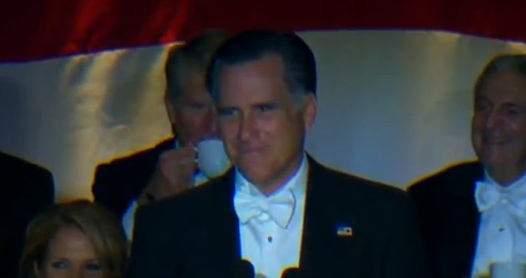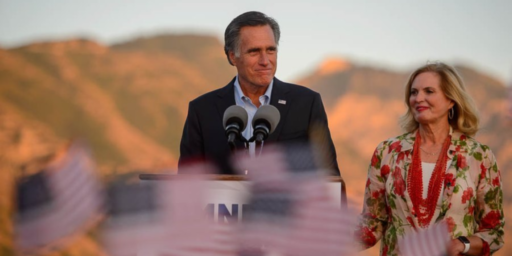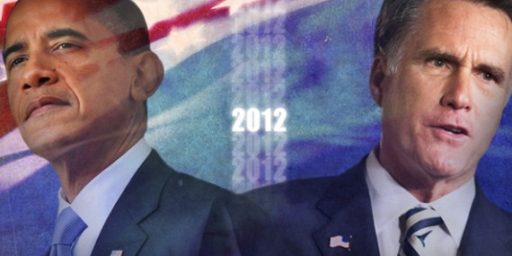Mitt Romney: Kingmaker?
Mitt Romney decided not to run in 2016 but he's very much in the race.
Mitt Romney decided not to run in 2016 but he’s very much in the race.
POLITICO (“Mitt’s new mission: Romney is working to rid the GOP presidential primary of the mayhem that marked his own race“):
Mitt Romney is working with an unlikely collaborator — Sheldon Adelson, the billionaire casino mogul who bankrolled Newt Gingrich’s 2012 campaign — in the hopes of ensuring that the GOP primary produces a mainstream conservative without any of the mayhem that marked his own race.
The two, who speak monthly, aim to convince the wealthy contributors bankrolling various candidates to work together to avoid the kind of primary election chaos that Romney believes laid the seeds for his defeat in 2012. The former Massachusetts governor is also considering endorsing a candidate to achieve his goal.
They’re unmistakable signs of Romney’s newly assertive role in the Republican Party but also of his determination to guarantee the GOP an unbloodied nominee with broad-based appeal.
It was all on display at the E2 Summit this week, which drew around 250 of his most loyal donors and prominent supporters to the Stein Eriksen Lodge, a luxurious five-star ski resort. Six Republican presidential hopefuls also made the Utah trip — one of whom, Scott Walker, used part of his nearly 40-minute speech to pay tribute to Romney’s father, former Michigan Gov. George Romney. Chris Christie, during a Friday afternoon speech, paid homage by saying the 2012 nominee had been clairvoyant in the warnings he’d raised about the direction of the nation’s foreign policy. “I don’t think that Mitt’s got the apology note yet from the president,” said the New Jersey governor, who prior to his address spoke with Romney backstage.
For a failed nominee who waged a presidential bid that many in his party found disappointing, Romney maintains a striking degree of influence. In part, it’s because of his unique mix of business acumen and political skills, but it’s also a recognition of his deep access to the complex, jungle-like world of super PAC donors. In a party that lacks a unifying figure, he’s eager to fill the void.
“I think he realizes he has a good role to play,” said Ron Kaufman, a longtime Romney friend and adviser who is a Republican National Committeeman. “He can be a senior statesman.”
But serving as a middle man between the candidates and big money donors is hardly a “senior statesman” role.
One big question hanging over Romney is whether he’ll endorse a candidate. He would be most likely to provide his seal of approval, friends say, if the primary contest turns into a battle between a pragmatic candidate and one who isn’t.
“There’s the possibility that there might be someone who emerges strong who I agree with on a whole host of issues, and then someone else comes along who I find not as attractive from a policy standpoint or another standpoint. And at that stage I might jump in and go to work to help the one who’s more in tune with the things I believe,” Romney told reporters on Friday evening.
The value of that assistance would be considerable. Aside from his sprawling network of powerful donors, he has access to Restore our Future, the super PAC that supported his 2012 presidential bid and remains active. The group has nearly $200,000 in its bank account.
“He wants to win,” said Spencer Zwick, Romney’s former finance chairman and one of his closest confidants. “The question is whether we nominate a candidate who can win the general election.”
Romney, however, is wary of the risks involved in getting behind a contender. He’s relishing his role as an informal adviser — Marco Rubio, Jeb Bush, and Chris Christie have all sought him out for his private counsel — and endorsing would mean relinquishing that power.
That’s more interesting, I guess, but endorsements don’t much matter in an era where there’s so much media and everyone has direct access to the voters. I voted for Romney in 2012 and value his insights but can judge for myself which candidate to support once the race has played out more.
Those that have spoken with Romney say the pain and introspection over his 2012 loss hasn’t completely subsided. In February, during a private dinner at Adelson’s home before a group of Jewish Republican donors, the former governor held forth on foreign policy, analyzing the turmoil abroad. “He said he wished he could be president, because he wanted to deal with these problems,” said one person in the room.
At other times, he seems to reflect on his failings as a candidate. “In my case there were a long list of mistakes. So which one is at the top I can’t judge,” he joked lightheartedly to reporters on Friday. Romney noted that he was “far from successful” in selling his campaign to minorities.
He’s still on a search for answers. Zwick — one of the most sought-after Republican operatives — has remained neutral in the 2016 race, and has undertaken a research project aimed at better understanding the reasons for Romney’s 2012 defeat with a goal of not replicating them for the future.
“He wants to be involved in whatever way he can be,” said Romney’s eldest son, Tagg. “And one of the ways he can be involved is helping whoever the future nominee is learn from his successes and also from his mistakes.”
There’s much more value to be had here. As the runner up for the 2008 nomination and nominee but failed general election candidate in 2012, Romney has better insights into the vagaries of running for president than perhaps anyone. But, frankly, most of Romney’s “mistakes” were simply a function of the fact that he’s not a great retail politician and comes across as downright weird when he tries to connect with ordinary folks. I’m not sure that any amount of advice can help someone with similar deficits overcome them.
When Romney decided earlier this year that he wouldn’t seek the presidency, it took some of his aides by surprise. He’d pondered running for about a month, speaking to many of the people in his network — a brief exploratory that, for a time, led many to believe he’d launch a third consecutive bid.
On Friday, Romney provided a window into his decision not to run, saying it reflected a calculation of his prospects. He recognized, he said, that “someone who wasn’t as negatively defined as I was in some circles, and someone who was the next political generation, had a better chance of getting the White House than I did. I said, ‘You know, I’ve had two shots, I really should let someone else who I think has a better shot getting the presidency have a chance to do so.”
The role of party elder seems to suit him. At this week’s summit, the third that Romney has hosted, he was in good spirits. Romney — who was often criticized for his stiff appearance — was tie-less, his hair less gelled and parted than in the campaign. On Friday morning, on his way to Rubio’s speaking event, he called out to a group of reporters to follow him into the auditorium. “Come on, guys,” he said smiling.
“I don’t look back and second guess,” Romney said. “I don’t say, ‘Oh, I should have made a different decision.’ I’m glad I made the decision I did.”
So . . . less hair gel?
In many presidential races in my adult lifetime, the losing candidate would second-guess themselves afterwards for being overly staged managed and not just being themselves. Bob Dole in 1996 and Al Gore in 2000 ares the most obvious examples but John McCain in 2008 and to a lesser extent Romney in 2012 fell into the trap, too. Romney doesn’t have the ability to connect across audiences in the way that Ronald Reagan, Bill Clinton, or Barack Obama did but few do; indeed, they’re the list in my lifetime. Romney would have been more appealing simply owning who he was. Still, he was up against not only a better politician but a sitting president with a rising economy; he was likely going to lose regardless.
Beyond that, while I very much support Romney’s goal of finding the most attractive Republican candidate to run against, presumably, Hillary Clinton next fall—and doing so without fracturing the party in the process—it’s not at all clear how he’ll have much influence over that fact. The real story seems to be that Sheldon Adelson, who poured so much money into Newt Gingrich’s quixotic run last go around, seems to be on board. Having candidates without much appeal drop out of the race early rather than being propped up by big donors would be helpful.
Better still would be a revival of Reagan’s “11th Commandment.” If the candidates for the nomination would compete on the basis of their experience and vision for the country rather than attacking their opponents as insufficiently conservative, the GOP would be in much better shape. To the extent Romney can help do that behind the scenes—whether by controlling the flow of money and dangling his endorsement—he’ll be valuable. But there’s next to zero chance of that happening, given the fractured state of the party, the ridiculous number of candidates, and the modern media environment.







I always thought Romney should have been a cabinet secretary or VP rather than a presidential candidate. That way his inability to communicate with large groups would not have been such a liability. Anyway, while he may have some ability to moderate some of the extremes on domestic policy, his foreign policy, as nearly as I could discern, was also one of maximalist intervention as is espoused by most of the current candidates. I assumed he took those positions since he thought it would help with turnout. Do you think he will advise the current crop of candidates towards a less militaristic foreign policy?
Steve
Romney is proving to be an interesting study of the dynamic of how an individual functions within an environment. How much better of a politician, a candidate and a citizen would Romney have been if he been around in the 70s or 80s before the GOP went off the deep end?
Mike
I never felt like he cared much about being President. He likes the idea of adding that to the resume, but his passions are in business.
I kind of doubt how much Romney will have. With the self-aggrandizement and narcissism of a Ted Cruz, I doubt anyone will come out of the GOP primary looking good.
@MBunge:
Much better, I’d say.
But given the chance to steer to GOP, what did he do? Even if he does become a kingmaker in the GOP, his legacy will always be Benghaaazi!
Sounds like a self appointed attempt by Romney to eliminate any vestiges of influence from those populists or general citizens… government for the wealthy by the wealthy.
How much influence can Romney have. I didn’t read anything about putting any money up. Isn’t that all that matters? Even a semi-corrupt, semi-disloyal billionaire like Adelson has more influence.
Too many candidates in the race for this to be plausible. One negative ad can target swathes of competitors. The strategy is too appealing.
People have been proclaiming a GOP civil war for a long time, but I think a wide, shallow presidential field like this one is probably the biggest symptom.
There is a lot to be learned from studying the failures of another, but getting advice from someone who believes that
Well, he was a political loser time and again for many reasons, not least of which was his inability to see his own failings (remember his surprise at losing in 2012?)
If you want to win, you listen to winners, not losers.
@Tillman: It certainly is a sign of how fractured the GOP are.
Jeb Bush reminds me of Romney. They both seem distant and lacking a personality.
What about the possibility that he’s just going to wait out the bloodbath, then jump in and present himself as the anointed chosen once again?
Romney can’t solve the problem of the Republican policy agenda being either insane or stupid. Whichever candidate wins is going to have to defend a policy program that is profoundly wrongheaded, and more to the point, unpopular to those outside the Fox News demographic.
@OzarkHillbilly: Agreed. I don’t think Romney can advise anyone based on his “successes and mistakes” because I don’t think he will admit to many mistakes, at least not substantial ones.
@grumpy realist: I can’t imagine that working out. The only groups who’d welcome a savior in that scenario would be the establishment; the base would mutiny on them.
There’s an interesting juxtaposition of two news stories this weekend: On one hand the Iowa straw poll is cancelled and on the other Mr Romney hosts a virtually secret conference of billionaires and Repub would-be candidates. As poorly as the ‘straw poll’ reflected anything like a ‘voice of the people’ the ‘E-2’ meetings are much much worse. Such a coincidence pretty much explains the path of the Repubs (and to a sad extent of all America’s leadership).
Of course, if you’re a libertarian the richest of us have proven their superior leadership qualities by becoming inordinately wealthy (usually by inheritance, of course.)
OT, but has anyone been following the meltdown that has been going on in the negotiations between Greece and everybody else?
Being a hard sell during negotiations is one thing; being obnoxious to the point that the other side gets to the point where they don’t really CARE if you go down the financial rathole is something completely other. The rest of Europe seems to be reaching that point of “eff you!”
I’ve gotten to the point where I’m starting to agree with the people who suspicion whoever’s running Greece doesn’t want to stay in the Euro. The powers that be with never admit it, because the Greek populace wants to stay in the Euro, but this level of incompetence in negotiating is to the point where I have to think it’s deliberate. They just want the other side to lower the boom, so they can paint themselves as the poor suffering victims of the wicked IMF/EMC.
I don’t know how they’re planning to cover all the pensions. (Similarly to those of us here in Illinois, where like Greece, we’ve got a Supreme Court that tells us it’s illegal to cut back on the pensions.)
He has the money — why doesn’t he just become a GOP sugar daddy and fund a candidate to his liking?
That picture up there… The white tie… The Black tails… Putting on the Ritz !
https://www.youtube.com/watch?v=w1FLZPFI3jc
Sing it… you magnificent creation, you !
Seriousy? They seem readily available, starting with 47% and his apparent sincerity when he said it. So he doesn’t understand, and yet he’s offering advice.
I was really looking forward to seeing President Romney increase military spending, cut taxes and balance the budget as promised without cutting a single thing.
An emptier suit would be hard to find.